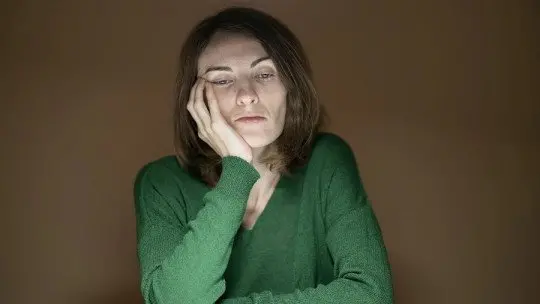
If you were asked to describe a happy person, how would you do it? Surely, it happens to you like me, and you would answer that someone who is constantly smiling, who has a very active social life (and shares it on different social networks), who always has optimistic phrases for everyone, who probably has a partner and many hobbies. In conclusion, a person who enjoys her life.
But what happens if these behaviors are just a “front”? Can we ensure that they are really happy because of the things they publish on their social networks or because of what we perceive? As the title of the article says, “Not everything is as it seems.”
The same happens with depression. When we think of a depressed person, we imagine someone with the following characteristics: deep sadness, frequent crying, no energy or motivation to carry out activities, who sleeps a lot and has suicidal thoughts. And many times this is the case, but in this article I want to focus on another side of this pathology, less known and very dangerous: smiling depression.
What is smiling depression?
We can define it as a term used to designate people who externally appear happy, and often share it on their social networks, but internally they live with a persistent emptiness, sadness, hopelessness. Inside, they have depression.
They may strive to maintain a happy lifestyle because they believe it will make them feel better, or they may do so so as not to worry other people. I have also met people who do it as a habit, automatically. They are functional people, who at first glance, their depression has not deteriorated any area of their life.
This term is not recognized in the Diagnostic and Statistical Manual of Mental Disorders (DSM-V), and is surely diagnosed as Major Depressive Disorder with atypical characteristics, since Depression is experienced in a hidden way, without externalizing the symptoms of their low mood..
Do you have specific symptoms?
Depression presents differently in each person. In the case of smiling depression, they may present sadness, feelings of emptiness, hopelessness, decreased pleasure or interest in all or almost all activities most of the day, almost every day.
There may be agitation or slowness, fatigue or loss of energy, feelings of worthlessness, or excessive or inappropriate guilt.. There may even be a decrease in the ability to think, concentrate and make decisions.
The difference in smiling depression is that these symptoms would be absent or almost absent in public. Which would prevent people around you from suspecting that you are suffering from depression. However, Some symptoms are recognized that may be present and give us “clues” that we may be suffering from depression:
Difficulty in diagnosis and risks
The fact that the symptoms are covert and the person shows false happiness makes it difficult to identify that they are depressed. We meet people who, apparently, have no reason to be sad, they can have an idyllic life. This can happen in adolescents, young people and adults.
What aggravates this pathology is that affected people take much longer to seek support as they do not recognize the disease, and having difficulty identifying their emotions, having an emotional block, makes work on a psychological level more complicated.
It’s important pointing that Living pretending that nothing is happening, repressing discomfort, requires a high emotional, physical and energetic cost., which worsens over time, until it becomes “unbearable.” And this is when suicidal thoughts appear, which in smiling depression are associated with a greater risk, since by maintaining a high energy level they are more likely to carry it out.
We have all heard of a case of a person who commits suicide and family and friends had not seen “signs” of depression, quite the opposite. A well-known example is the case of actor and comedian Robin Williams, his death and diagnosis of depression surprised many people.
Important considerations
People who find it difficult to talk about their problems and have an emotional block that prevents them from expressing their feelings are more at risk of suffering from smiling depression.. They tend to be perfectionist people, with a great sense of demand and responsibility, which leads them to have the need to control everything around them, taking care of +“fixing” everything, without asking for help or recognizing their limits.
Treatment
Like all depression, has treatments that include medications and psychotherapyto promote emotional, thinking and lifestyle changes.
Psychological therapy will be focused on accepting the situation, learning to recognize and express your emotions, using tools and techniques to adequately deal with your mood and resolve conflicts that arise in your daily life. Cognitive-behavioral therapy and Acceptance and Commitment Therapy have scientifically proven their effectiveness.
It is very important that you trust the professional you choose, that you establish a safe therapeutic bond, that you feel that they respect you, understand you and that they can accompany you in the process that you are going to start. This is essential for the therapy to be successful.
When to ask for psychological help?
If, no matter how much you feel that you have everything you have wanted or desired, and that you should be happy, but you feel an emptiness that you cannot explain, and it is difficult for you to express your emotions, in addition, you force yourself to continue with your life, repressing your feelings and acting like you’re happy… you may be suffering from depression.
If when you are with more people you are fine, but when you are alone you get down, you feel emptiness or sadness, you can’t stop eating even if you are not hungry… you may also be suffering from depression.
It is not enough to take medication. I recommend that you make an appointment with a professional specialized in mental health, who will interview you and help you identify if you have depression and how you can treat it. Don’t downplay these feelings., you don’t have to “settle” for surviving, you deserve to live your life to the fullest. Depression has treatment, you just need to take the step of opening up and seeking help virtually or in person.








